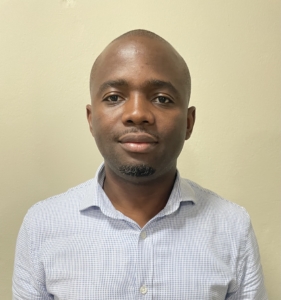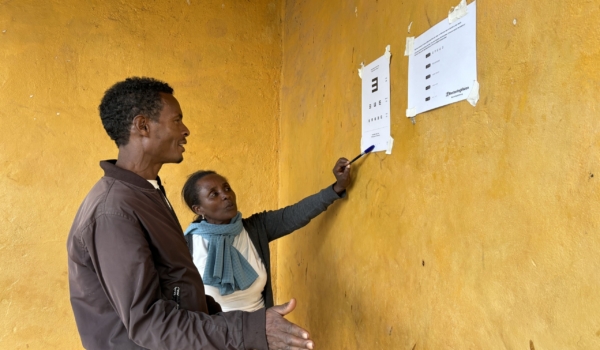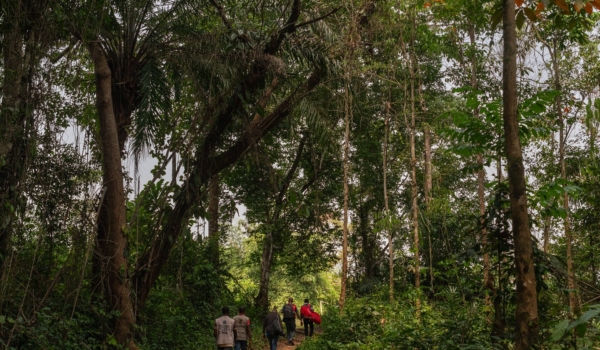When he was growing up in Monrovia, Lekilay Tehmeh dreamed of becoming a doctor. Even when his family was forced to flee Liberia’s civil war and became refugees in Cote d’Ivoire and Nigeria, that dream stayed at the top of his mind. “This has been something that had stuck with me for so long, so many years, even during exile, I still had that dream,” Lekilay said. After his family returned to Monrovia when he was a teenager, that dream guided his path—he went on to graduate from Cuttington University with a degree in biology, and then medical school at the University of Liberia.
Lekilay’s passion for public health grew during his tenure at Liberia’s Ministry of Health, where he served in a variety of roles while also doing direct clinical care at James Davis Memorial Hospital, a maternal and child health emergency hospital. When the Ebola outbreak began in 2014, he was seconded to the Liberia Medical and Dental Council to provide technical support on infection, prevention, and control work at health facilities nationwide. During this period, he led a nationwide survey of health facilities to determine the state of infection, prevention, and control preparedness and used the results to advise the government and partners on key measures that helped improve response efforts. This work led him to pursue a Masters of Applied Science degree in patient safety & healthcare quality at Johns Hopkins Bloomberg School of Public Health. He then applied what he had learned directly at the Ministry of Health in the Quality Management Unit for two years before joining the Last Mile Health team in January 2021.
It was during his tenure at the Ministry of Health that Lekilay was first introduced to Last Mile Health’s work to ensure access to primary healthcare for remote communities. He reflected that he admired the kind of impact that Last Mile Health was making, as well as the organization’s partnership with the Ministry of Health to launch and scale a national community health worker program. “The emphasis on education and training takes the entire program to another level. Community health workers have standardized curriculum, they get trained and supervised, when they have issues, they have access to a supervisor who is involved in their work,” Lekilay said.
He joined the Last Mile Health team as Liberia Medical Director in January 2021. “I saw an opportunity to do something to help the country and those who are in dire need of essential and high-quality health services,” he reflected. Lekilay was also drawn to Last Mile Health’s focus on clinical excellence and quality. In his role, Lekilay works directly with our Liberia Programs and National Community Health Systems teams to integrate clinical best practices and evidence into national policy and program strategy, to ensure the delivery of high-quality maternal, child, and neonatal health services. His work spans from the national level, where he advises on curriculum development for community health workers, to the community level, where he oversees quality of care assessments to ensure community health workers are delivering accurate and timely care for leading causes of childhood mortality like malaria.
Lekilay is also a leader in our ongoing response to the COVID-19 pandemic, which builds on his previous work at the Ministry of Health. In collaboration with partners like Last Mile Health, he supported the development of guidelines and training materials for health workers, the roll-out of training, infection, prevention, and control assessments at health facilities, and the creation of safety guidelines on topics like appropriate PPE use while at the Ministry of Health. Now, he’s working to support the next stage of the response—ensuring that response activities continue to support community and frontline health workers to safely provide routine care, while also preparing for the distribution of the COVID-19 vaccine. He is also leading our preparedness activities for Ebola, which has resurfaced in neighboring Guinea for the first time since the 2014 West African Ebola outbreak.
In moments of crisis, Lekilay knows that community health workers are essential to the health system. He said, “You cannot keep the community safe and you cannot keep a country safe if you don’t have the community taking ownership and taking charge of surveillance.” This is especially important in hard-to-reach areas, where community health workers are trained as first responders who can elevate issues within the community in real-time. He continued, “They are at the frontline, they are right in the community—they don’t sit at a health facility far-off. They get the first contact with whatever is going on. Their neighbors trust these individuals, because the communities recommend them to represent them in this program. Their role is so key in epidemic preparedness and response.”
At the heart of why community health workers are impactful is trust. “Imagine having someone stop at your doorstep and say, ‘Are you willing for me to spend 5 minutes to tell you about this situation?’ Community health workers can encourage you on a regular basis on how you can live a healthier life,” Lekilay explained. He’s seen the power of this with young children, who may be fighting malaria or malnutrition, and with pregnant women, who may have difficulty accessing antenatal care. He said, the primary healthcare provided by community health workers “helps us reduce most of the problems that health facilities will have to eventually deal with.” But there’s still too much demand for these services at the community-level, and he said, “we should increase the number of community health workers everywhere, even in advanced countries.”
As he looks to his future at Last Mile Health, Lekilay says patients will be his greatest teachers: “You should always learn from patients to provide better healthcare services for them.”





